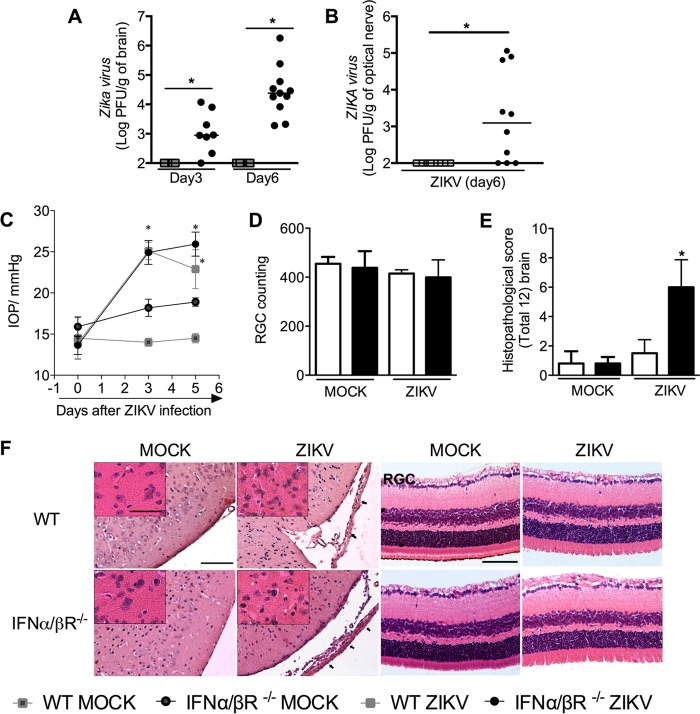N-Methyl-d-Aspartate (NMDA) Receptor Blockade Prevents Neuronal Death Induced by Zika Virus Infection
Zika virus (ZIKV) infection is a global health emergency that causes significant neurodegeneration. Neurodegenerative processes may be exacerbated by N -methyl-d-aspartate receptor (NMDAR)-dependent neuronal excitoxicity. Here, we have exploited the hypothesis that ZIKV-induced neurodegeneration can be rescued by blocking NMDA overstimulation with memantine. Our results show that ZIKV actively replicates in primary neurons and that virus replication is directly associated with massive neuronal cell death. Interestingly, treatment with memantine or other NMDAR blockers, including dizocilpine (MK-801), agmatine sulfate, or ifenprodil, prevents neuronal death without interfering with the ability of ZIKV to replicate in these cells. Moreover, in vivo experiments demonstrate that therapeutic memantine treatment prevents the increase of intraocular pressure (IOP) induced by infection and massively reduces neurodegeneration and microgliosis in the brain of infected mice. Our results indicate that the blockade of NMDARs by memantine provides potent neuroprotective effects against ZIKV-induced neuronal damage, suggesting it could be a viable treatment for patients at risk for ZIKV infection-induced neurodegeneration. IMPORTANCE Zika virus (ZIKV) infection is a global health emergency associated with serious neurological complications, including microcephaly and Guillain-Barré syndrome. Infection of experimental animals with ZIKV causes significant neuronal damage and microgliosis. Treatment with drugs that block NMDARs prevented neuronal damage both in vitro and in vivo These results suggest that overactivation of NMDARs contributes significantly to the neuronal damage induced by ZIKV infection, and this is amenable to inhibition by drug treatment.
Authors
Vivian V Costa; Juliana L Del Sarto; Rebeca F Rocha; Flavia R Silva; Juliana G Doria; Isabella G Olmo; Rafael E Marques; Celso M Queiroz-Junior; Giselle Foureaux; Julia Maria S Araújo; Allysson Cramer; Ana Luíza C V Real; Lucas S Ribeiro; Silvia I Sardi; Anderson J Ferreira; Fabiana S Machado; Antônio C de Oliveira; Antônio L Teixeira; Helder I Nakaya; Danielle G Souza; Fabiola M Ribeiro; Mauro M Teixeira
External link
Publication Year
Publication Journal
Associeted Project
Microbiology or Immunology
Lista de serviços
-
StructRNAfinder: an automated pipeline and web server for RNA families prediction.StructRNAfinder: an automated pipeline and web server for RNA families prediction.
-
CEMiTool: a Bioconductor package for performing comprehensive modular co-expression analyses.CEMiTool: a Bioconductor package for performing comprehensive modular co-expression analyses.
-
webCEMiTool: Co-expression Modular Analysis Made Easy.webCEMiTool: Co-expression Modular Analysis Made Easy.
-
Assessing the Impact of Sample Heterogeneity on Transcriptome Analysis of Human Diseases Using MDP Webtool.Assessing the Impact of Sample Heterogeneity on Transcriptome Analysis of Human Diseases Using MDP Webtool.
-
Predicting RNA Families in Nucleotide Sequences Using StructRNAfinder.Predicting RNA Families in Nucleotide Sequences Using StructRNAfinder.
-
OUTBREAK: a user-friendly georeferencing online tool for disease surveillance.OUTBREAK: a user-friendly georeferencing online tool for disease surveillance.
-
Noninvasive prenatal paternity determination using microhaplotypes: a pilot study.Noninvasive prenatal paternity determination using microhaplotypes: a pilot study.
-
Editorial: User-Friendly Tools Applied to Genetics or Systems Biology.Editorial: User-Friendly Tools Applied to Genetics or Systems Biology.
-
Automatic detection of the parasite Trypanosoma cruzi in blood smears using a machine learning approach applied to mobile phone imagesAutomatic detection of the parasite Trypanosoma cruzi in blood smears using a machine learning approach applied to mobile phone images
-
Tucuxi-BLAST: Enabling fast and accurate record linkage of large-scale health-related administrative databases through a DNA-encoded approachTucuxi-BLAST: Enabling fast and accurate record linkage of large-scale health-related administrative databases through a DNA-encoded approach
-
Ten quick tips for harnessing the power of ChatGPT in computational biologyTen quick tips for harnessing the power of ChatGPT in computational biology

